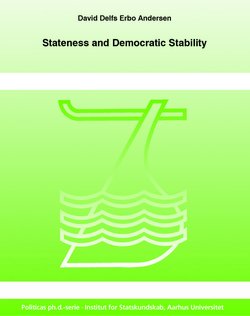David Delfs Erbo Andersen
Stateness and Democratic Stability

This dissertation approaches the state-democracy nexus by disaggregating the concept of state and investigating whether and how different state attributes stabilize democracies. The dissertation proposes employing the overall concept of stateness and distinguishing between three attributes: monopoly on violence, administrative effectiveness, and citizenship agreement. It places the varieties of stateness explanations within the confines of modernization theory and the dynamics of economic crises but argues that their importance for democratic stability in any case depends on the specific stateness attribute under scrutiny. The dissertation then theorizes a number of testable mechanisms that connect weaknesses in the attributes with democratic breakdown. Based on original coding of the attributes and related components in all democratic country-years 1918-2010, the dissertation examines the propositions empirically in a comparative case study of interwar Germany, Spain, Czechoslovakia, and Finland, a statistical analysis of the effect of the stateness attributes on democratic stability 1918-2010, and a causal process observations analysis of the mechanisms among all democratic breakdowns. The results show that while monopoly on violence exerts a positive, significant effect on democratic stability even after control for confounders such as economic development and crisis, democracy levels, and international and regional effects, the effects of administrative effectiveness and citizenship agreement are much more fragile. Specifically, a history of civil-military contestation, one version of a disputed monopoly on violence, is consistently the most commonly observed mechanism leading to breakdown. The dissertation thus suggests that state-democracy researchers disaggregate the state and proposes a number of future research venues.
![]() Ophavsretten tilhører Politica. Materialet må ikke bruges eller distribueres i kommercielt øjemed.
Ophavsretten tilhører Politica. Materialet må ikke bruges eller distribueres i kommercielt øjemed.